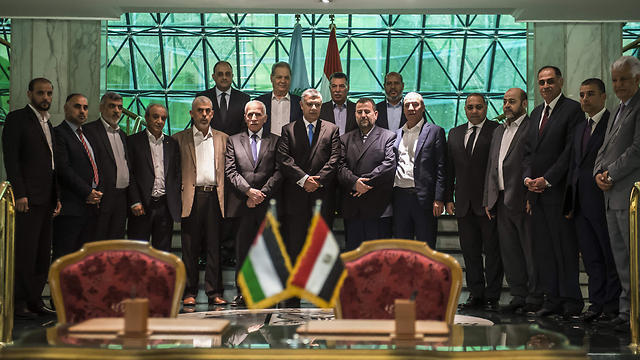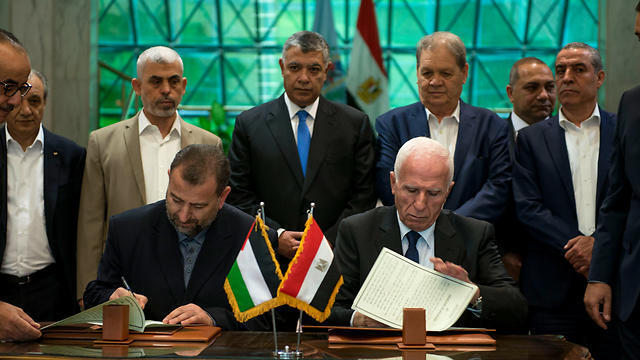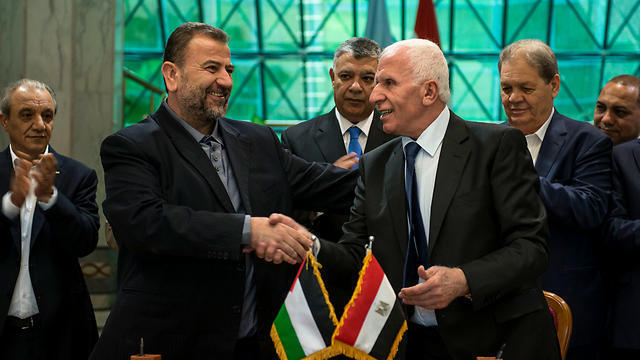Getting your Trinity Audio player ready...
The players in the Middle East, including Israel, are closely following the Palestinian reconciliation process, which led to an Egyptian-brokered agreement signed between Hamas and Fatah ,and its ramifications to each of the players.
The agreement, brokered by Egyptian President Abdel Fattah al-Sisi, boosts Cairo’s standing as the only one capable of bridging the tensions between Hamas and Fatah, out of a declared intention of creating momentum for the peace process between the Palestinian Authority and Israel.
If talks between Israel and the Palestinians are actually renewed, Egypt will likely play an important role in these negotiations and regain leadership of the axis of Sunni states, supported by the United States and Europe, against the Russian-backed Shiite-Iranian-Syrian axis.
3 View gallery


Israel is becoming a key element in the transformation of the initial agreement signed in Cairo into a Palestinian unity agreement
(צילום: AFP)
The reconciliation agreement is already considered, rightfully, as a significant achievement for Fatah and Palestinian President Mahmoud Abbas. It’s a first step in a long process aimed at, theoretically, reunifying the PA under “one law, one police and one government,” according to Fatah official Jibril Rajoub.
Alongside an improvement in the harsh living conditions in Gaza, this first step is expected to include the opening of the Rafah Crossing while handing back control of the crossings to the PA. The integration of PA people in Gaza’s policing system and the transfer of administrative control authorities over to the Palestinian government are considered an achievement for Abbas.
Following the combined Egyptian-PA pressure and in light of the weakness of Qatar, which provided Hamas with political and financial support that allowed the organization to keep controlling the strip, Hamas is now forced to accept the PA’s foothold in Gaza. The organization refused, however, to discuss the important issue of disarming its military wing. In a preliminary reference to the issue, Hamas representatives declared that as long as the Israeli occupation continued, they would not give up their weapons, which are directed at Israel.
The disagreements
The internal Palestinian battle between the Fatah-led national movement and the religion-based movement led by Hamas, focuses on three fundamental matters of contention, which naturally would not be solved by the reconciliation agreement.
The first issue is a definition of the occupation. Hamas seeks the liberation of all lands from the Mediterranean Sea to the Jordan River, and Fatah is willing to settle for a return of the lands occupied in 1967.
The second bone of contention is whether the Palestinians efforts to end the occupation should focus on armed resistance, which is Hamas’s position, or on a combination of an unarmed popular uprising and international activity, which is Fatah’s position.
And the third question is regarding the image of the future Palestinian state—a sharia-based Islamic state or a democratic state.
And what about Israel?
Israel is becoming a key element in the transformation of this initial agreement into a Palestinian unity agreement. Israel’s justified demand to disarm Hamas may only be fulfilled—if at all—as a result of an Israeli-Palestinian peace process, which will be perceived by the Palestinian society as a genuine process leading to a two-state agreement.
The PA will be able to lead such a move—which has been perceived as impossible until now—in the spirit of Rajoub’s comments (and Israel’s demands), only if it has the Palestinian street’s support. Now, with the absence of a peace process, about 75 percent of the Palestinian public are in favor of armed violence. In the 1990s, during the peace process, the Palestinian majority was in favor of diplomacy and opposed Hamas’s terror attacks.
On the one hand, the reconciliation agreement strengthens Fatah’s relatively moderate approach and weakens Hamas’s violent approach. On the other hand, Hamas is becoming a significant part of the united Palestinian leadership and may physically and ideologically take over that leadership one day. To prevent this risk, and to work firmly to disarm Hamas and counter the security threat on Israel, we must give the Palestinian public a reason to favor Fatah’s approach over Hamas’s approach, and see the Palestinian unity as an opportunity rather than just as a danger.
In order to increase the potential positive trends, Israel must convey a real willingness to reach a two-state-for-two-peoples solution in a gradual, reliable and consistent manner. The best way to do so is by announcing that Israel has no sovereignty claims over all the lands outside the settlement blocs, and expressing this declaration through action, by enacting a voluntary evacuation law for settlements located outside the main settlement blocs, within Palestinian territory.
Naturally, the IDF will remain in the area until a full agreement is signed and the security responsibility will remain in Israel’s hands. Furthermore, there will be no forced evacuation of any community before the fate of settlers living east of the security fence is determined in a permanent agreement.
The American administration, which likely supported the reconciliation agreement, must also keep up the momentum and advance the process to the next stage. If President Donald Trump really believes the Israeli-Palestinian conflict can serve as a milestone in a process aimed at creating stability and reducing the level of violence and terrorism in the entire Middle East, he has the ability to point Israel and the Palestinians in the right direction.
The Cairo agreement presents a challenge not only to the Palestinian leadership and society, but also the Israeli society, the Israeli government, the Egyptian-led Arab world and the entire international community. This challenge is an opportunity that should be seized by anyone who is interested in solving the conflict, so that this intra-Palestinian reconciliation agreement—the latest in a series of agreements and unifications that have all failed in the past decade—can succeed and make it possible to move forward toward a permanent agreement with Israel.
Ami Ayalon, Gilead Sher, Orni Petruschka are the founders of non-partisan political movement Blue White Future.



